What is Paratha Roti? What is Buss up shot /buss up shut roti?
Early Sunday mornings, the Trini in me heads straight to the kitchen to make fried bake or roti for my family. But since I am allergic to raw flour [it makes me sneeze, my eyes swell, and I itch], my husband helps.
Cooking is not one of his hobbies, so I developed this recipe for him. He has been using it for a few months and does a great job every time. If he can do it, anyone can! And no, I am not being dishonest about the flour allergy to get him to help me.
[P.S.] Don’t be intimidated by the length of this post; I wanted to include as many photos and detailed instructions as possible to make it easy for you!
What is paratha made of?
The primary ingredients in paratha are all-purpose flour, baking powder, salt, and sometimes sugar. Many Trinidadians also knead the roti with whole milk to make it softer. To cook the roti, butter, vegetable oil, coconut oil, ghee or vegan substitutes can be used.
Why is Paratha Roti called buss up shot in Trinidad?
It is called buss up shot because of its texture, appearance, similarity to a torn (burst) t-shirt, and the act of beating it at the end to unravel the layers. Leave it up to a Trini to come up with a name like that.
How is paratha served in Trinidad?
It is usually the roti of choice served with various vegetables or meat dishes at weddings and religious gatherings(poojas/prayers).
What are some specific dishes to enjoy with paratha?
From my experience, a typical Trini husband had his meal delivered to his hands. At these gatherings, I first witnessed men involved in the cooking process, including making roti. It shocked me every time.
My Nana was a master roti maker
My Nana (my mother’s father) was one of those master “roti makers,” and when he gave up that role, my auntie Jang, his daughter, assumed that prestigious title. I was always front and center when the cooking for these special occasions took place, and I was always eager to look, learn, and assist. [Future cookingwithria in training]
While I was in Trinidad earlier this year, I learned that one of my hubby’s neighbors is a roti maker. I couldn’t wait to go over to her house to see her in action. Luckily for me, she was very willing to let me watch her in action, unlike many cooks I know who guard their recipes with their lives.
How to make healthier paratha at home?
This is an authentic recipe, the real deal, but when I make paratha at home, I decrease the amount of clarified butter to one teaspoon and use extra virgin olive oil to brush on the dough while cooking. I also make 5 rotis instead of four because of the size of my tawa.
Why make paratha instead of buying?
Home-made paratha most definitely contains less fat than the ones we buy in restaurants. It’s no surprise they usually melt in your mouth, and stick to your-hips tender. The price we pay for goodness…
How to store paratha dough?
Two of these are usually enough for my family of four. The remaining dough is covered tightly(glass bowl or resealable bag) and placed in the refrigerator for a day or two to enjoy with another meal.
What is the difference between paratha roti (buss up shut roti) and dhalpuri roti?
Paratha roti is a flaky, layered roti that gains its flakiness from the unique wrapping technique employed as well as the act of beating it with two dablas (wooden spoons) at the end of cooking to release the layers.
On the other hand, dhalpuri roti is stuffed with ground and seasoned yellow split peas, and then simply rolled out and cooked. Check out that recipe here.
The dough for the paratha is softer than that of the dhalpuri, however, both rotis are oiled or buttered during the cooking process to soften and assist int he cooking process.
Is Paratha and Guyanese oil roti the same?
While both the texture of the dough as well as the wrapping technique is the same, many Guyanese cooks use oil to wrap and cook the roti, whereas in Trinidad paratha roti, butter, ghee, oil or a combo is used.
What is a clap roti?
In addition, Guyanese clap the hot roti between the palms of their hands to release the layers(an act referred to as ‘clapping the roti” hence ‘clap roti’), whereas Trinis or Trinidadians use a dabla or flat wooden sticks to beat it on the tawa(cooking griddle) to unravel the layers.
Why do Trinis beat their roti?
Following the last explanation, Trinis beat the roti at the end of cooking to release the layers created during the wrapping process. During the wrapping process the dough is rolled out, and cut at the 4 o’clock point from the center to the edge of the dough, the dough is then folded into a cone and the ends tucked in.
What equipment is needed to cook paratha?
In Trinidad, we use a tawa, chowki(wooden round board to roll the roti on), belnah (rolling pin), 2 dablas(wooden spoons).
What is a tawa?
The tawa(Indian term), also known as tawah, thawah, or thavah, is a versatile griddle commonly used in Indian and Trinidadian kitchens. Typically made from cast iron (my preference) or aluminum, these round pans range from 8 to 16 inches in diameter, though professional kitchens have much larger versions.
What is a good substitute for a tawa?
If you do not have a tawa, you can use a frying pan or griddle.
What are the other types of roti in Trinidad?
Click here for a comprehensive list.
Trinidad Paratha Roti (Buss up Shut) Recipe
Serves 6-8
Ingredients you will need for paratha roti:
For kneading the dough:
all-purpose flour (preferably organic, unbleached)
baking powder (preferably aluminum-free)
salt
brown sugar
lukewarm water (sometimes require a little more or less–add until soft)
vegetable oil
For filling the dough:
clarified butter (ghee) or butter (or half butter and oil or coconut oil)
Flour for dusting
To cook the paratha:
1/4 cup vegetable oil and/or butter (healthier alternative: use light olive oil or coconut oil)
*** (if using salted butter, reduce salt)
VEGAN OPTION–Use coconut oil or olive oil.
Directions
Knead flour:
In a large bowl, combine the flour, baking powder, salt, and sugar.
Gradually add water to make a shaggy, soft dough. Rub 1 tablespoon of oil over the dough. Cover with a cloth and let rest for 15–30 minutes. (Sometimes only requires 5–10 minutes of resting if the dough is very soft)
Fill and wrap paratha:
Divide the dough into 4 equal pieces. (if you have a very small tawa or griddle, make 5)
Press each dough into a large circle using fingers or rolling pin. Using your fingers (or the bottom of a spoon), rub the surface of the dough with clarified butter. The larger the circle – flakier the roti!
Sprinkle with flour. Cut the dough downwards from the middle of the top edge (12 o’clock) to the center of the dough.
Cook the paratha
When ready to cook the roti, heat a tawa, dry cast-iron skillet, or griddle over medium heat until hot.
Working with one ball of dough at a time (keep the remaining dough covered) and using just enough flour to prevent sticking to counter and rolling pin, press the dough into a small, flat circle (about 4 inches).
Using the rolling pin, roll the dough. Flip, rotate, and roll until it becomes a thin, even 10-inch round (or as large as your tawa), making sure that the edges are not thick. If you can’t make it round, don’t worry; it tastes just as good.
When the roti is fully cooked, use a wooden spatula to beat the roti gently, accumulating the edges toward the center (start at the top and work your way down), until the layers separate.
Repeat rolling out and cooking the remaining dough, stacking and wrapping the finished roti in the cloth. Once they are all cooked, let them rest in the cloth for 10-15 minutes before serving. During this time, they will steam themselves, becoming more soft and pliable.
Well-wrapped roti keep in the freezer up to a month. Thaw overnight in the refrigerator and reheat before using.
This is how my babies and I love it when reheated….crispy/cripsy…
Hope I have inspired you to make this delicious paratha roti! Enjoy with some of my other recipes on this site including channa and aloo, bodi, curried chicken, stewed chicken, saltfish and tomatoes, baigan and tomato choka….or any of your favorite dishes….
Trinidad Paratha Roti (Buss up Shut) Recipe
Ingredients
For kneading the dough:
- 4 cups all purpose flour preferably organic unbleached
- 2 teaspoons baking powder preferably aluminum free
- 1 teaspoon salt
- 2 teaspoons brown sugar
- About 1 3/4 cups lukewarm water sometimes require a little more or less--add until soft
- 1 tablespoon vegetable oil
For filling the dough:
- 4 tablespoons ghee ghee or butter (or half butter and oil or coconut oil)
- Flour for dusting
To cook the paratha:
- 1/4 cup vegetable oil and/or butter/ghee healthier alternative - use light olive oil or coconut oil
Instructions
Knead flour:
- In a large bowl, combine the flour, baking powder, salt and sugar.
- Gradually add water to make a shaggy soft dough. Rub 1 tablespoon oil over dough. Cover with a cloth and let rest for 15-30 minutes. (Sometimes only requires 5-10 minutes of resting if the dough is very soft)
Fill and wrap paratha:
- Divide the dough into 4 equal pieces. (if you have a very small tawa or griddle make 5)
- Press each dough into a large circle using fingers or rolling pin. Using your fingers (or the bottom of a spoon) rub the surface of the dough with clarified butter. Larger the circle - flakier the roti!!
- Sprinkle with flour. Cut dough downwards from middle of the top edge (12 o'clock) to the center of the dough.
- Roll clockwise into a cone.
- Take the end of the dough and tuck it under the cone.
- Push the tip of the cone downwards into the dough.
- Let it rest for 30 minutes.
Cook the paratha
- Working with one ball of dough at a time (keep the remaining dough covered) and using just enough flour to prevent sticking to counter and rolling pin, press dough into a small flat circle (about 4 inches).
- Using the rolling pin, roll the dough. Flip, rotate and roll until it becomes a thin, even 10 inch round(or as large as your tawa), making sure that the edges are not thick. If you can't make it round, don't worry, it tastes just as good.
- Drizzle or brush about 1/2 tablespoon oil over the surface of the roti. Flip.
- Drizzle or brush oil over the other side. Flip.
- Turn and repeat on the other side, cook another 15 seconds.
- Repeat rolling out and cooking the remaining dough, stacking and wrapping the finished roti in the cloth. Once they are all cooked, let them rest in the cloth for 10-15 minutes before serving. During this time, they will steam themselves, becoming more soft and pliable.
Video
Notes
Nutrition
Until next time,
Cooking with love,
Ria
ALSO EAT WITH:
AS PART OF A DIWALI FEAST, CLICK HERE
SAUTEED PAK CHOI RECIPE | PAK CHOY | PATCHOI
FRY BODI RECIPE (TECHNICALLY SAUTEED NOT FRIED)
TOMATOES CHOKA RECIPE
BAIGAN CHOKA (EGGPLANT CHOKA) CLICK HERE FOR RECIPE
PUMPKIN TALKARIE (SAUTEED PUMPKIN) RECIPE CLICK HERE
TRINIDAD STEWED CHICKEN RECIPE
CURRIED GOAT CLICK HERE FOR RECIPE
DHAL (SPLIT PEA SOUP) CLICK HERE FOR RECIPE
Trinidad Paratha Roti (Buss up Shut) Recipe
Ingredients
For kneading the dough:
- 4 cups all purpose flour preferably organic unbleached
- 2 teaspoons baking powder preferably aluminum free
- 1 teaspoon salt
- 2 teaspoons brown sugar
- About 1 3/4 cups lukewarm water sometimes require a little more or less--add until soft
- 1 tablespoon vegetable oil
For filling the dough:
- 4 tablespoons ghee ghee or butter (or half butter and oil or coconut oil)
- Flour for dusting
To cook the paratha:
- 1/4 cup vegetable oil and/or butter/ghee healthier alternative - use light olive oil or coconut oil
Instructions
Knead flour:
- In a large bowl, combine the flour, baking powder, salt and sugar.
- Gradually add water to make a shaggy soft dough. Rub 1 tablespoon oil over dough. Cover with a cloth and let rest for 15-30 minutes. (Sometimes only requires 5-10 minutes of resting if the dough is very soft)
Fill and wrap paratha:
- Divide the dough into 4 equal pieces. (if you have a very small tawa or griddle make 5)
- Press each dough into a large circle using fingers or rolling pin. Using your fingers (or the bottom of a spoon) rub the surface of the dough with clarified butter. Larger the circle - flakier the roti!!
- Sprinkle with flour. Cut dough downwards from middle of the top edge (12 o'clock) to the center of the dough.
- Roll clockwise into a cone.
- Take the end of the dough and tuck it under the cone.
- Push the tip of the cone downwards into the dough.
- Let it rest for 30 minutes.
Cook the paratha
- Working with one ball of dough at a time (keep the remaining dough covered) and using just enough flour to prevent sticking to counter and rolling pin, press dough into a small flat circle (about 4 inches).
- Using the rolling pin, roll the dough. Flip, rotate and roll until it becomes a thin, even 10 inch round(or as large as your tawa), making sure that the edges are not thick. If you can't make it round, don't worry, it tastes just as good.
- Drizzle or brush about 1/2 tablespoon oil over the surface of the roti. Flip.
- Drizzle or brush oil over the other side. Flip.
- Turn and repeat on the other side, cook another 15 seconds.
- Repeat rolling out and cooking the remaining dough, stacking and wrapping the finished roti in the cloth. Once they are all cooked, let them rest in the cloth for 10-15 minutes before serving. During this time, they will steam themselves, becoming more soft and pliable.
Video
Notes
Nutrition

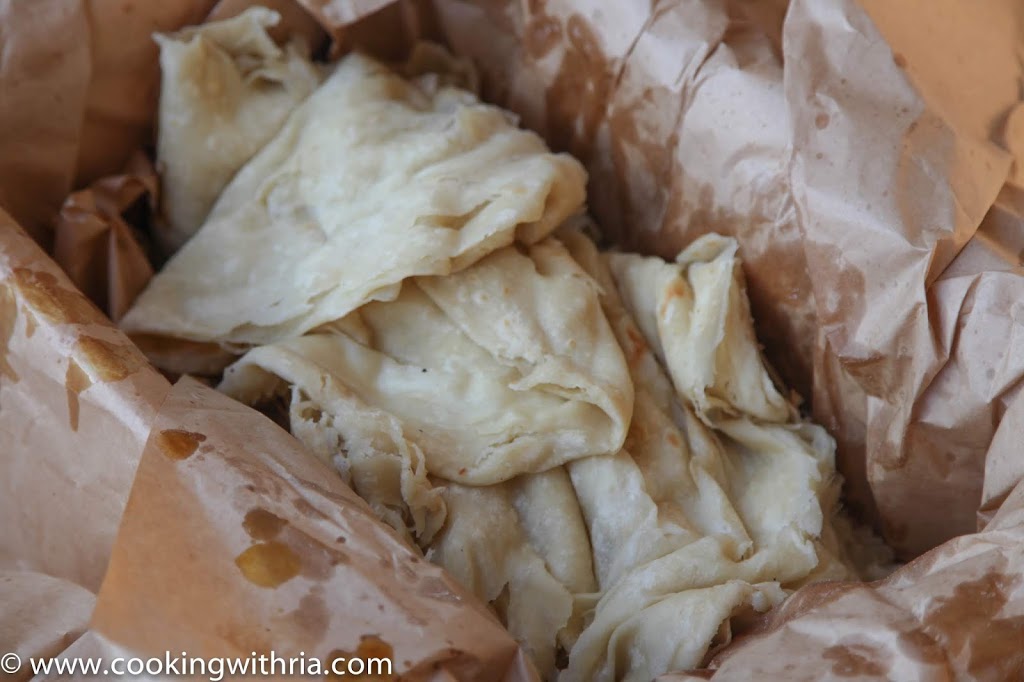

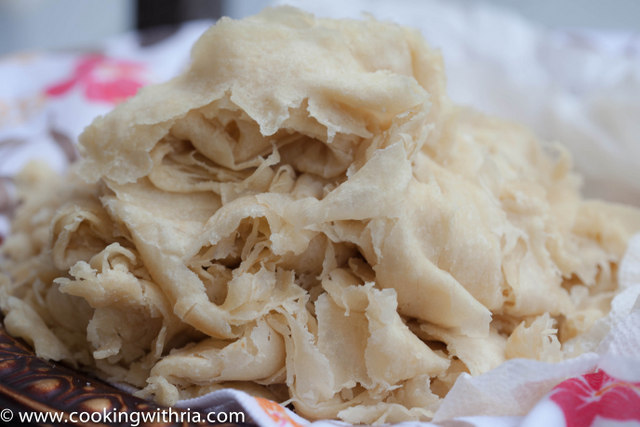
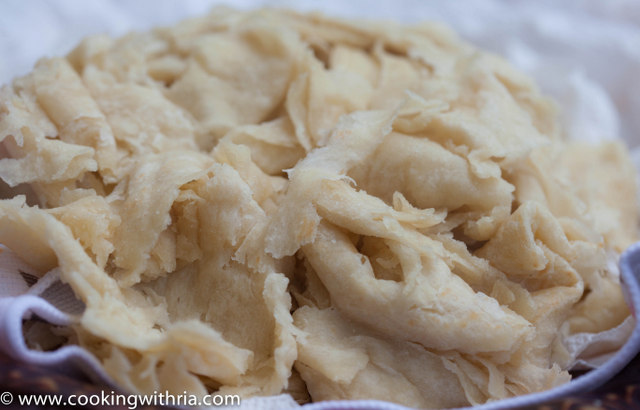
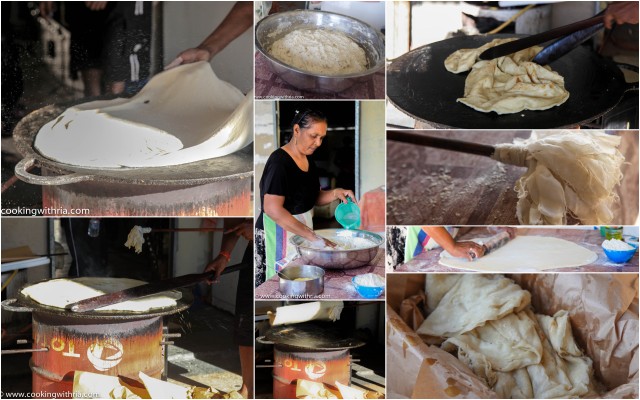





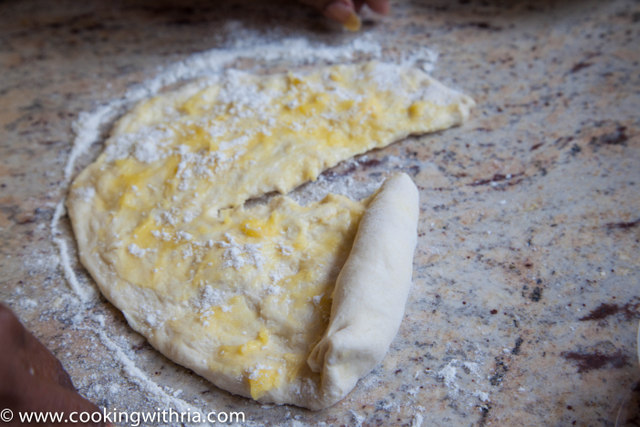
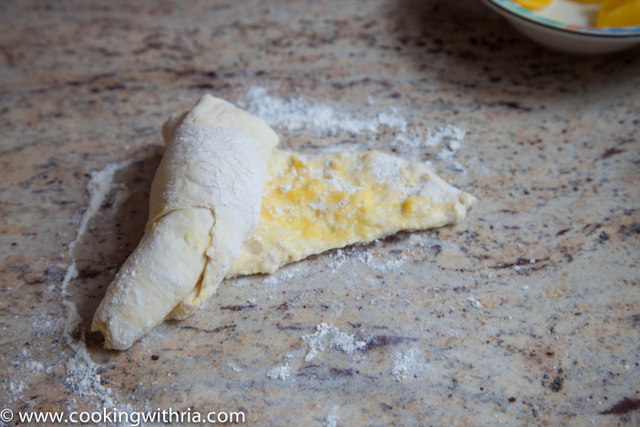
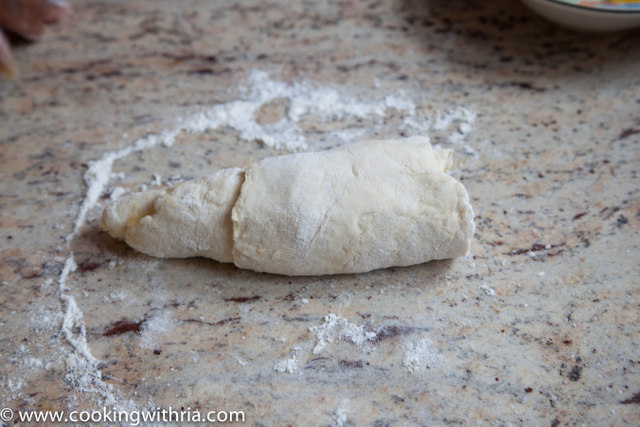
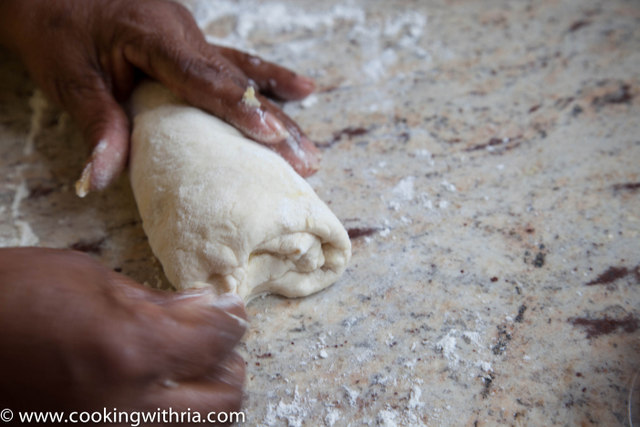
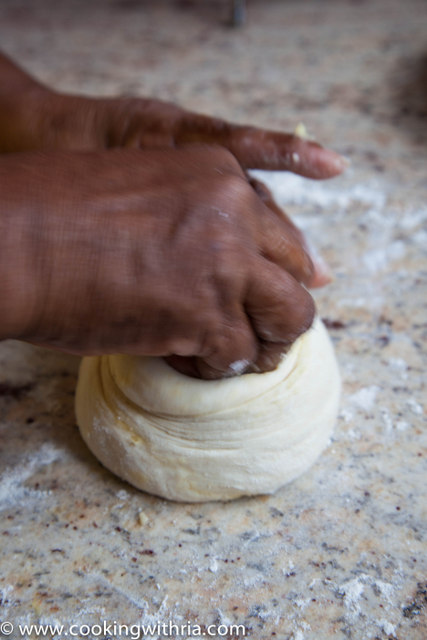

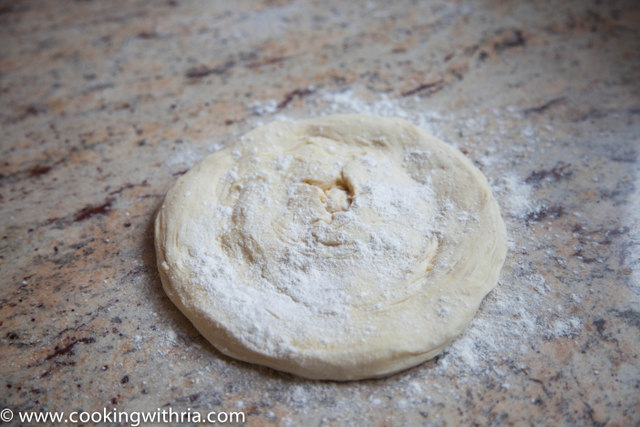


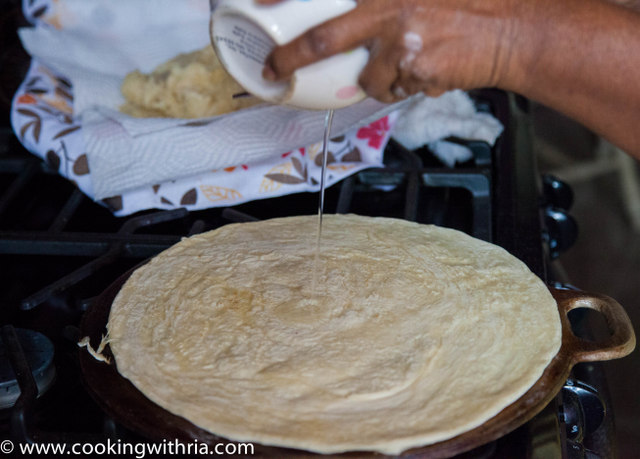



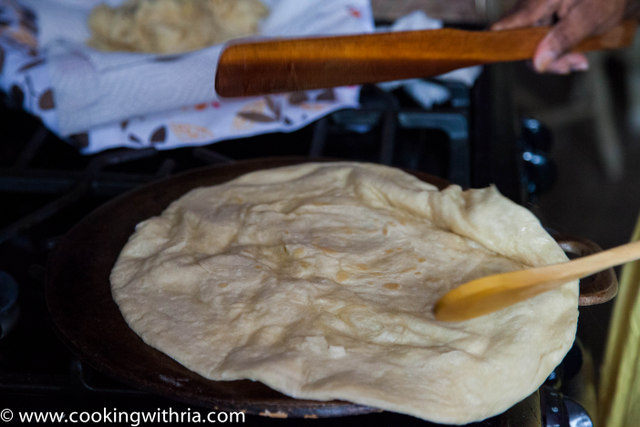

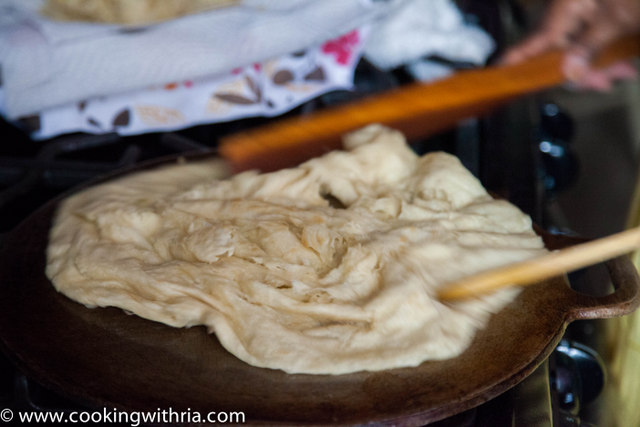
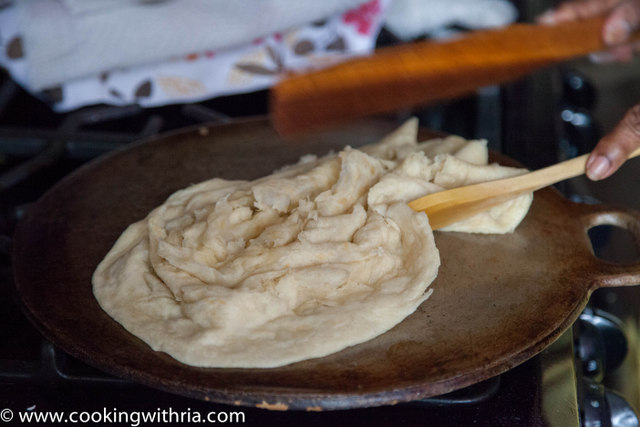
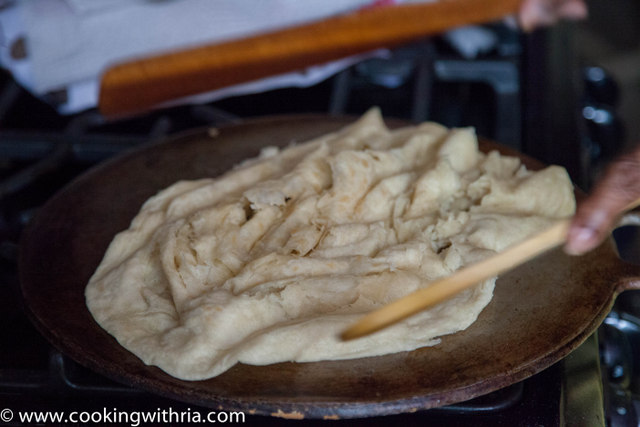
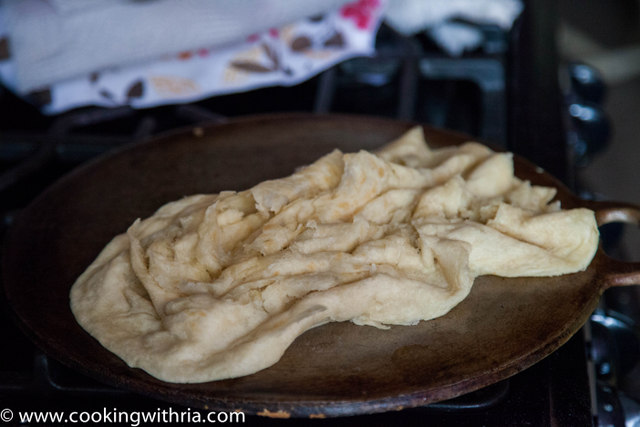

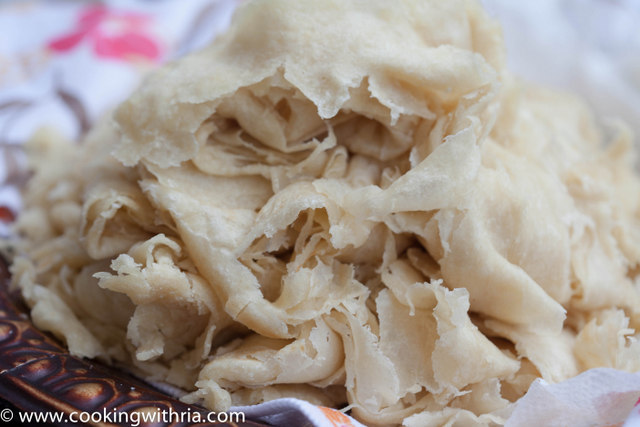

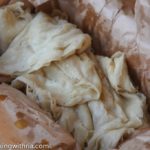
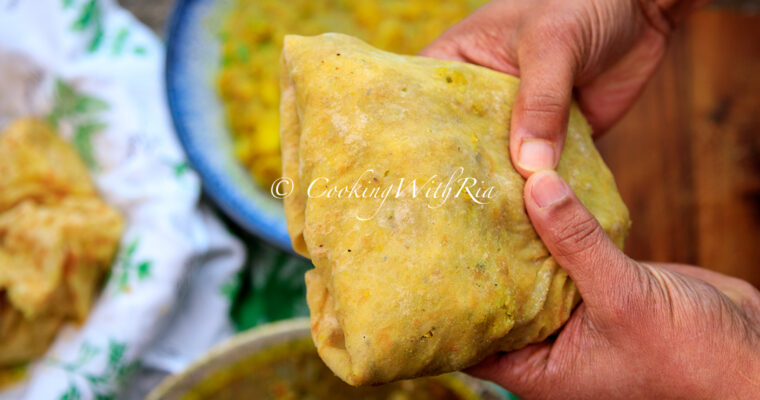
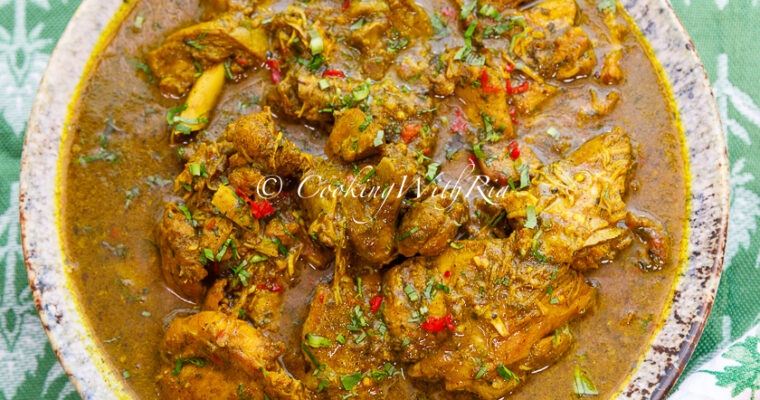
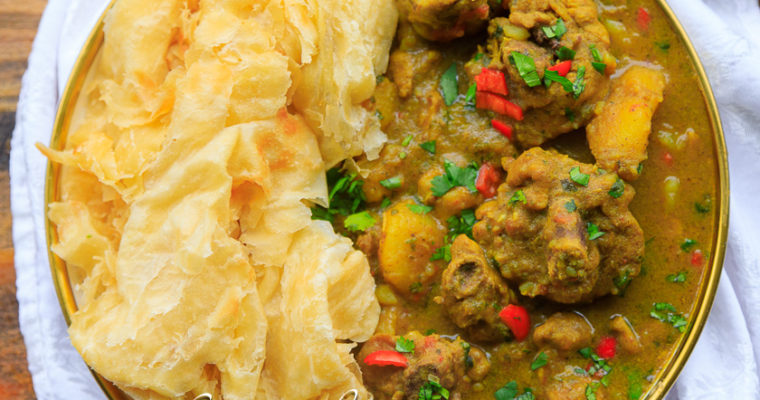
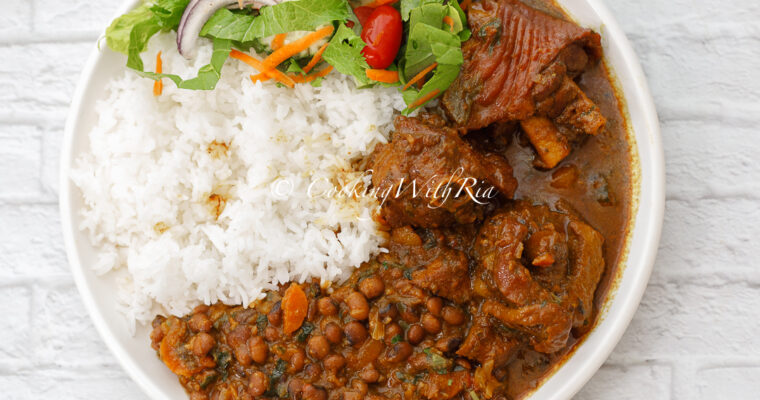
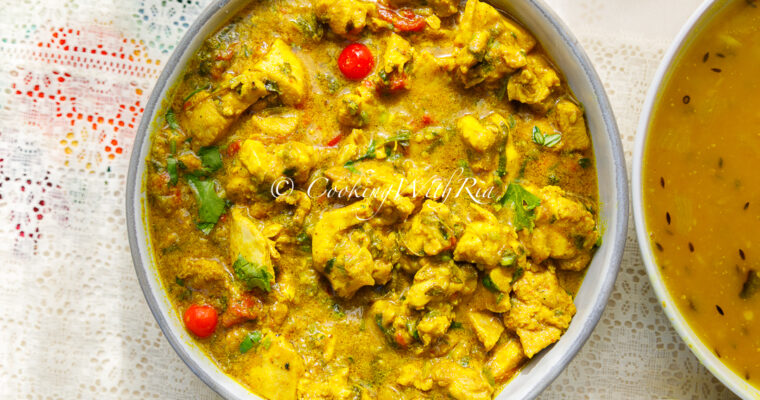
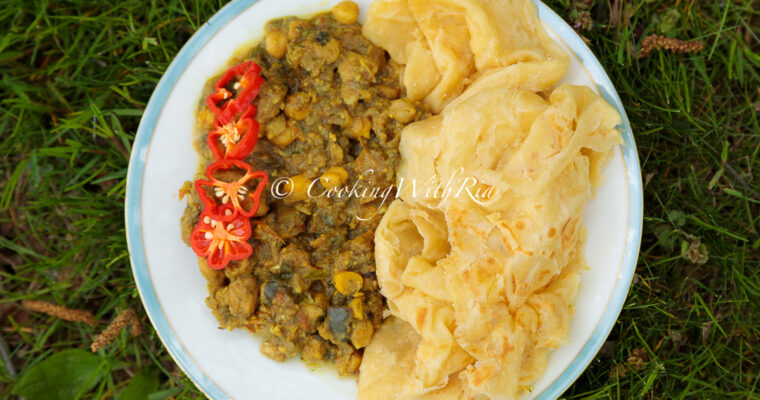
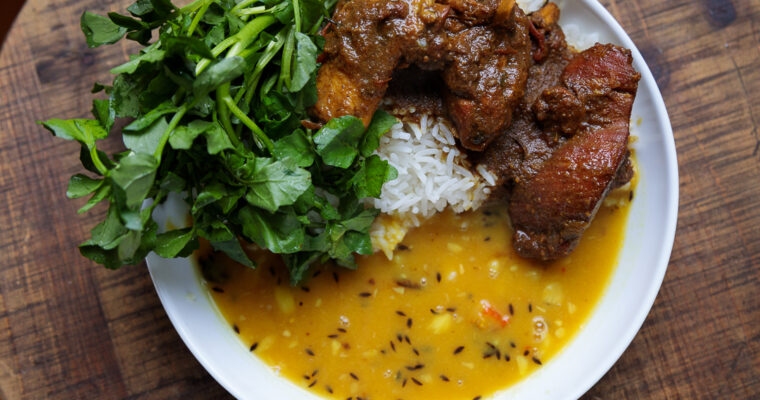
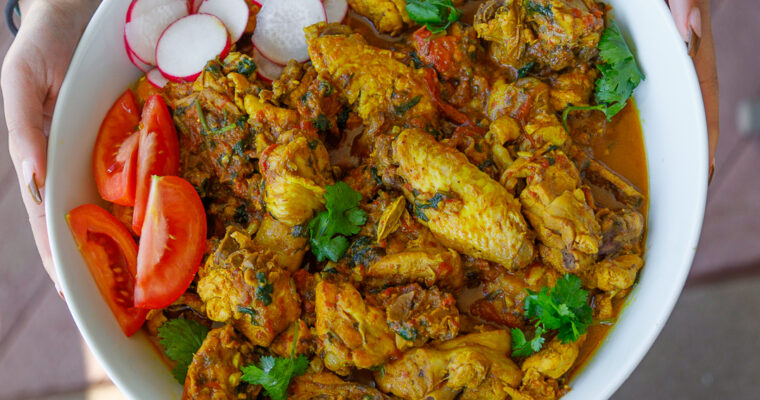
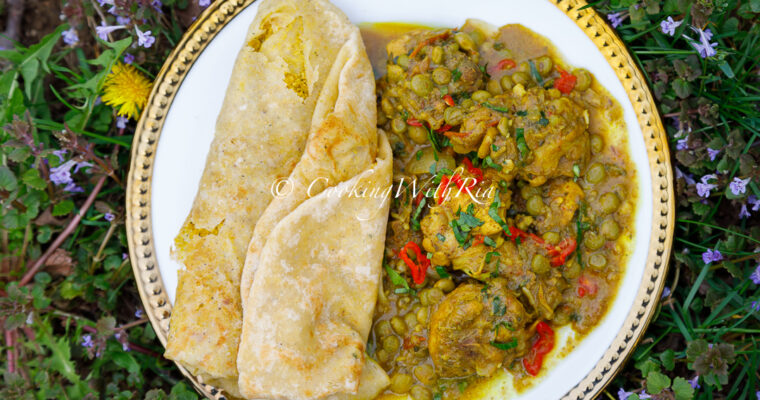
I can't remember the last time I had Paratha, my god I wish I was living closer to you. I enjoy your step by step instructions, it's time consuming but the end result is well worth it !!!! I'll definitely give it a try,thanks much!
Thanks so much for this recipe. Can't wait to try it. Will let you know how I fared. God bless.
Thanks, Nicole! It would be nice to have you as a neighbor again! Let me know how it turns out!
Sherry Ann: You are most welcome. Good luck and God Bless you too.
It has started….
Ria…fantastic light..Naps lost again..tastes delicious..
It's a pity I can't add the pic
i made it today! it came out great. this is the best recipe i got on the internet. THANK YOU 😀
Thanks Randy! Happy to hear that! 🙂
Thank you!! I think I finally found a recipe where my roti does not come out stiff. This has been a great help.
Thank you Lena..I am happy to hear that my recipe worked for you!
Thank you very much Ria! We're living in England now and can't seen find a Trini style Roti cuisine. So I guess I'll have to make it by myself, with the help of you, of course! Your recipe was very detailed, also with a good sense of humour, I'm impressed! Will let you know how it turned out, keep up the good work!
Thank you! Just for a minute until it's all combined .You don't want a smooth dough..soft and shaggy will do.
what can i replace the ghee with? when you mentioned using less salt if using salted butter were you referring to the ghee?
The recipe was very easy. The buss up shot was great and everyone loved it. Thanks Ria! My new favorite recipe:)
Thank you so much Anntionia!
Tramaine, you can replace the ghee with regular butter, and no I was not referring to the ghee. Hope your paratha turned out great..
I will have to give this style a try! I made some last night – my 1st attempt – and it was good, but just a little thicker than I wanted. Thanks for this post!
http://www.thedowntownbohemian.com
You should post that video that you promise in this post. I'm a self-taught American roti maker…learned what little I know from the internet and experimentation…and one thing I know for sure is that the key step in the whole process is getting the right consistency of dough. That's partly the flour-water ratio and partly the kneading technique. "Shaggy" is the right word for the consistency you want, but I always have a hard time handing dough that wet unless I put a ton of oil on my hands. The youtube poster known as "Guyana Rude Boi" currently has the best roti-making video out there, but it would be very easy to make a better one,and you should do it. Thanks for all the great recipes.
Where can one get an authentic Tawa? Even if is has to be shipped from overseas and not what they're selling in the US as a "tawa"
I've been looking for Gluten free options. What flour do you use??
The Tawa,is also known as a 'baking stone',here in the UK,the Welsh people use it to make Welsh cakes..
I am definitely going to have a go at this. Looks so delicious.Thank you. I was always on rhetoric look out for a good recepie.
Thank you so much Ria
Hi, I found you on YouTube and boy am I glad. I am living in Trinidad but I never had anyone to teach me so i am so happy to be learning from you. It is such a joy because I enjoy cooking so much and I don't want to be limited by my lack of knowledge. Making curry chicken and potato today so this seemed like the perfect side!
I already started the dough (i halved the recipe and used butter and coconut oil) i think i made it too sticky at first with too much water but it come together really well with a little oil on my hands when i roll it out n put the butter/oil. I'm waiting atm for the loyas to rest a bit and then i will try my best with the tawah, the one i plan to use to saykay some sada this weekend actually! (Yes, i learned that from you too!) I am leaving this comment open to update so in the next paragraph i will tell u more about the final product!
Oh my goodness! I still have the curry on my fingers as i type this! Amazing! So perfect! Even my 4yo niece couldnt get enough! I was scared it wouldn't separate at first and ok one was a little browner than i would have preferred for presentation and besides that was just the outside! I am appropriating this recipe also i added a couple tablespoons of powdered milk to the dough. I loved it and it made the perfect amount. Thank you thank you thank you! Saturday will be sada and choka day! I can't wait!!!
Regards
Annie♡
I can't remember the last time I had Paratha, my god I wish I was living closer to you. I enjoy your step by step instructions, it's time consuming but the end result is well worth it !!!! I'll definitely give it a try,thanks much!
I can't remember the last time I had Paratha, my god I wish I was living closer to you. I enjoy your step by step instructions, it's time consuming but the end result is well worth it !!!! I'll definitely give it a try,thanks much!